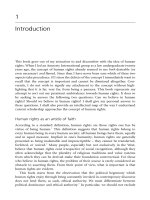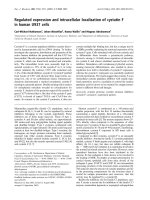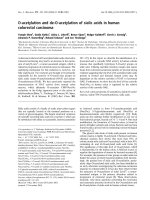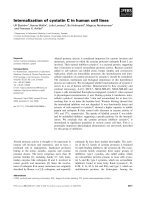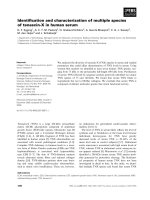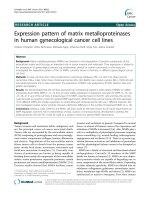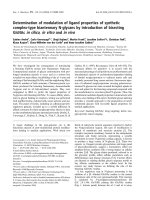Introduction of Who Believes in Human Rights
Bạn đang xem bản rút gọn của tài liệu. Xem và tải ngay bản đầy đủ của tài liệu tại đây (2.62 MB, 18 trang )
1
Introduction
This book grew out of my attraction to and discomfort with the idea of human
rights. When I led an Amnesty International group as a law undergraduate twenty
years ago, the concept of human rights already seemed to me both desirable (or
even necessary) and flawed. Since then I have never been sure which of these two
aspects take precedence. If I stress the defects of the concept I immediately want to
recall that the concept is important and cannot be dismissed altogether. Con-
versely, I do not wish to signify my attachment to the concept without high-
lighting that it is far, very far, from being a panacea. This book represents my
attempt to sort out my persistent ambivalence towards human rights. It does so
by seeking to answer the following two questions: Can we believe in human
rights? Should we believe in human rights? I shall give my personal answer to
these questions. I shall also provide an intellectual map of the way I understand
current scholarship approaches the concept of human rights.
Human rights as an article of faith
According to a standard definition, human rights are those rights one has by
virtue of being human.
1
This definition suggests that human rights belong to
every human being in every human society: all human beings have them, equally
and in equal measure. Implied in one’s humanity, human rights are generally
presented as being inalienable and imprescriptible – they cannot be transferred,
forfeited, or waived.
2
Many people, especially but not exclusively in the West,
believe that human rights exist irrespective of social recognition, although they
often acknowledge that the plurality of religious traditions and value systems
from which they can be derived make their foundation controversial. For those
who believe in human rights, the problem of their source is rarely considered an
obstacle to asserting them. From their point of view, what is important is that
human rights are evident.
This book starts from the observation that the political hegemony which
human rights enjoy through being constantly invoked in contemporary discourse
does not lend them, as such, ethical authority. We must differentiate between
political dominance and ethical authority.
3
In particular, we should not exclude
the possibility that political utopias and/or forms of organization which are
outside the human rights logic can be superior to it.
4
This is too easily forgotten
in a world where human rights have become, in the words of Elie Wiesel, the
secular religion of our time.
5
Human rights is an article of faith.
6
The fundamental tenet of this credo is that
human rights exist and are universal, inalienable and self-evident. I personally do
not believe in this, for reasons expounded below. My personal answer to the
question ‘Can we believe in human rights?’ is that it makes no rational sense to
believe in human rights because, as far as I can see, reason disproves them.
7
Despite this, I hesitate to answer negatively the question of whether we should
believe in human rights. Though an atheist, I may wish to appeal to the value of
loving thy neighbour especially in front of a Christian. In the same way, I consider
human rights to be the vehicle of useful values in our contemporary world.
Though it does not appear to me intellectually tenable to ‘believe’ in human
rights, I am ready to act as if I believed in them in a world where they have
become part of the received wisdom – the more so since I almost believe in them,
having been socialized in them and being persuaded by some of the values they
seek to express. In short, I consider human rights as a potentially useful resource
in my world. As far as I am concerned, using them strategically is not hypocritical,
but a way to attain moral aims in the absence of a more persuasive language in
which to articulate claims for emancipation. This position is not devoid of
contradictions, but it is the best formulation of it I can achieve thus far.
The short-sightedness of the universal assertion
My main reason for objecting to the credo of the human rights orthodoxy has to
do with their supposed universality – a characteristic so central to their definition,
essence and raison d’e
ˆ
tre that it has practically become a trope in human rights
discourse.
8
As an anthropologist, I do not see how one can say that human rights
exist on a universal plane, nor do I see that human rights are such a good thing
that it would be wonderful if they existed on a universal plane. Let me try to
explain what I mean through an example.
How would Native Americans have reacted, had they been presented with the
concept of human rights before they were colonized and, in many cases,
virtually exterminated? Surely they would have objected to its strange, homo-
centric ethos.
9
They have indeed asked and continue to ask: what kind of
existential dignity prevails when it applies only to human beings, moreover
merely those who happen to be in the world of the living?
10
This example is
pertinent because ‘the Indians’ have captivated the contemporary Western
imagination for having developed a cosmology which is more respectful of land,
water, animals, plants and, arguably, even human beings than Western society.
Thesameconclusioncouldbedrawninrespect of many other societies round
the globe.
11
2 Who Believes in Human Rights?
The idea that human rights are universal flies in the face of societies which are
based on social, political and ethical premises completely foreign to the liberal –
and possibly market – logic of human rights. In other words, the concept of
human rights rests on a peculiarly short-sighted view of humanity. It is sometimes
suggested, including by anthropologists, that people who treat one another with
respect and compassion actually respect human rights even though they do
not use the term ‘human rights’. This approach appears to me to suffer from
‘occidentalism’.
I use this word as a pendant to ‘orientalism’. An example will illuminate my
meaning. Upendra Baxi recently talked at a conference of a ‘fatwa culture’ which
encompassed as much President George Bush’s as Osama bin Laden’s edicts on
the so-called war on terror.
12
A member of the audience objected to this termi-
nology, noting that such edicts were not fatwas in the traditional sense of the
Islamic term and that Baxi’s terminology had the effect of associating bad practice
with Islam and/or the East. By contrast, talking of human rights to refer to the
‘politics of dignity’ puts the West on a pedestal by using the Western word to refer
to a good practice or an ideal which can in fact be found across human societies. If
we want to talk of the politics of dignity, let us call them that and stress that
human rights is only one exemplar of such politics.
Tore Lindholm asserts that to talk of human rights before 1945 is anachro-
nistic.
13
Even if this view be considered too extreme, it remains the case that
most scholars locate the origin of the human rights discourse in the seventeenth
or eighteenth century, with the French ‘Declaration of the Rights of Man and
the Citizen’ a key moment. The point is that, whether their origin is counted in
terms of decades or centuries, human rights are a latecomer in the history of
humanity, however much they dominate contemporary political rhetoric. This
is enough to make me think that the concept of human rights – when it is
presented as a human constant – is not sound.
14
The proposition that human
rights exist irrespective of social recognition (affecting all human beings in all
human societies across time and space) does not make sense. It suggests
that human rights are and have always been somewhere out there – but where?
And why?
In my view, the concept of human rights conspicuously lacks ‘universal uni-
versality’ – at the very least their supposed universality does not exist across times
and places. There is thus perhaps a sense in which the conclusion to the second
question asked in this book is foregone: human rights are not universal, the
concept is flawed, we should not believe in it, and that is the end of the matter.
For Jack Donnelly among others, however, the ‘universality of human rights is a
moral claim about the proper way to organise social and political relations in the
contemporary world, not an historical or anthropological fact’.
15
Rather than
stopping the discussion at the fact that human rights is not an empirical constant
in humanity, I am willing to examine whether the world as you and I know it may
well demand something like a framework of human rights.
Introduction 3
Theshadowofthemodernstatefallsheavilyovercontemporarysociety;
thereforeacounterparttoitspower–and,incidentally,thepowerofanyinstitu-
tionasstrongasorevenstrongerthanthemodernstate–isacutelyneeded.Itis
thereforeinterestingtoaskwhethertheconceptofhumanrightsisvalidasitwere
onitsownground,definedastheworldaffectedbythemodernstateandallthat
comesinitstrain.Thisterrainisassuredlywide–itencompassesmostifnotallof
thecontemporaryworld–butitnonethelessceasestoembracethewholeof
humanityacrosstime.Thequestionraisedbythisbookcanthusberephrasedas
follows:inthelimitedarenaofthecontemporaryworld,whichproblemsaffect
theconceptofhumanrights?Aretheysuchastomakeit,evenonitsown
historicalterrain,invalid?
Practical and conceptual critiques of human rights
Scepticismregardinghumanrightshasalongpedigree.Classicalcritiquesof
humanrightsthusprovideanobviousstartingpointtocontemplatethefaults
plaguingtheconcept.Thisbookaccordinglycontainsaseriesoffive‘critical
light’chapterswhichrevisit,inturn,therealist,utilitarian,Marxist,particularist
(awordIfavourovertheexpressionculturalrelativist)andfeministcritiquesof
humanrights.
Attheriskofcaricature,themainthrustofeachcritiquecanbesummarizedas
follow:realists(amongwhomIincludeJeremyBentham)intimatethathuman
rightscannotbe‘above’or‘beyond’thestatebutnecessarilyoriginatefromand
areenmeshedwithinthestate;theyrejecttheideathathumanrightsarenatural,
existingoutsideofsocialrecognition.Utilitariansopposethegrantingofindivi-
dualrightsregardlessoftheconsequencesforthecommongood;nordothey
thinkitispossibleforhumanrightstobeabsoluteand/orinalienable.Marxists
viewrightsassustainingthebourgeoisorderandthusfeedingoppressionby
privilegingaparticularclasstothedetrimentoftheoppressedmajority.Particu-
laristsobjecttotheideathatmoraljudgementscanbemadewhichholdtrue
acrosscultures;theycallfortoleranceofpracticeswhicharenotcomprehensible
withinthedominantperspectiveanddenouncewhattheyseeastheinherent
imperialismofhumanrightswhicharenotuniversalbuttheproductofthe
societywhichhascreatedthem.Feminists,finally,attackhumanrights’pretence
ofequityandneutralitybyobservingthatrights,whichhavegenerallybeen
definedbymen,largelybypasstheinterestsandconcernsofwomen;theydispute
theideathathumanrightsaregender-neutral.
Noneofthesecritiquesismoreimportantthananyother,nordoesone
logicallyprecedeanother.Ihavechosentoarrangethefivechaptershistorically,
usingthedateoftheir‘foundation’text.Therealistchapter(Chapter3)comes
first chronologically, with as its starting point the text Jeremy Bentham wrote in
reaction to the 1789 French Declaration, where he argued: ‘From real law come
real rights; but from imaginary laws . . . come imaginary rights.’ Bentham’s
4 Who Believes in Human Rights?
prominentplaceintheutilitarianmovementnaturallyleadstothechapteron
utilitarianism,thoughmostofthedebatesreviewedinChapter4arecontem-
poraneous to us. The Marxist chapter follows: Karl Marx’s most direct comment
on the French Declaration was written in 1843, in his essay ‘On the Jewish
Question’. The American Anthropological Association’s ‘Statement on Human
Rights’, published a century later in 1947, is widely seen to epitomize the cultural
relativistpositiononhumanrightsandgivesapointofdeparturetoChapter6,
on particularism. The feminist chapter rounds off the series: despite Olympe de
Gouges’s ‘Declaration on the Rights of Woman’ of 1790 and the writings of those
such as Mary Wollstonecraft, a scholarly feminist critique of human rights has
only started to provoke wide academic engagement over the last two or three
decades.
In one way or another, each of these critiques points to a gap between the
human rights ideal (the promise that every human being enjoys a number of
fundamental rights) and the practice (a world where human rights violations
abound and where many people are excluded from the enjoyment of human
rights).
16
The gap could exist either because the practice has, so far, failed to live
up to the theory, but without this affecting the validity of the concept of human
rights, or because human rights cannot be what they are said to be, making the
concept invalid. In other words, critiques of human rights can either require
human rights to be true to their word or reject them as constructed on unsound
premises. In the former case, the problems which are identified are conceived as
demanding that a better human rights concept be found (possibly through
theoretical input) or that a better practice be elaborated. Crucially, there is no
suggestion that the concept is irretrievably defective: it is a matter of ‘simply’
closing the gap between what the concept promises and what it delivers. In the
latter case, the critique points to a concept which is fundamentally flawed, thus
advocating a solution which is altogether external to the human rights logic. In
the former case, the belief is that human rights must and can be improved;
17
in
the latter case, the concept of human rights is regarded as ultimately hopeless.
These two positions could be called the practical and the conceptual critiques of
human rights.
They cut across the classical critiques in that each of the latter comprises
elements which in principle accept the concept of human rights but demand that
it be better practised or conceptualized (or both) and elements which suggest that
the problem of the gap between human rights theory and practice can only be
solved by looking outside the human rights logic. Bentham famously described
the rights of man as ‘Nonsense upon stilts’, suggesting his was a conceptual
critique of rights; however, many utilitarians have defended theories of rights
which correspond closely to modern notions of human rights, thus allowing for
the development of a more practical critique of rights. Though this may come as
a surprise to some readers, Marx was less scathing than Bentham in his critique
of human rights. While he did not regard human rights as a panacea, Marx
Introduction 5
nonetheless welcomed their introduction as a step towards communism and the
emancipation of man. Moreover, a number of Marxist thinkers (including E. P.
Thompson and Etienne Balibar) have wholeheartedly approved of the rule of law
and the idea of rights. Cultural relativists seem intractably opposed to the idea of
human rights; more sophisticated particularists, however, recognize the impor-
tance of the aspiration to a universalist position as expressed in the language of
human rights even though they do not believe that pure ‘universality’ is attain-
able. Many, though not all, feminists work within a human rights agenda: they
denounce a practice which is blind to its neglect of women but without objecting
to the idea of a human rights agenda per se. In summary, each critique – which
always encompasses various strands – has a variety of answers on the question of
whether the gap between human rights theory and practice is due to a conceptual
or a practical failure.
Liberal and non-liberal critiques of human rights
Liberalism and human rights are closely connected,
18
with the polysemic term
‘liberalism’ probably meaning, in this context, the political philosophy which
holds that government should interfere as little as possible in the lives of its
citizens.
19
From this perspective, a government is liberal when it strives to provide
a forum in which citizens can pursue their own ends, in the absence of the
establishment of any collective goal. This liberalism can therefore be characterized
as ‘procedural’ (or ‘thin’)
20
rather than ‘substantive’ (or ‘thick’). Particularly
prominent in the Anglo-American world,
21
it puts great emphasis on the auton-
omy of the individual, and relies on the idea of giving the individual inalienable
rights.
22
Given the intimate connection between this kind of liberalism and
human rights, one might wish to ask: is a conceptual critique necessarily opposed
to liberalism? Taking it the other way around, is it possible to oppose the concept
(rather than the practice) of human rights from a liberal perspective?
Before answering these questions, it is worth identifying what the conceptual
critique of human rights consists of. The critique encompasses at least the
following three propositions: (1) the concept of human rights is wrongly pre-
sented as universal; (2) it pertains of a logic which focuses on the individual to the
neglect of solidarity and other social values; (3) it derives from a reasoning which
is far too abstract. The first point has already been touched on above when I noted
that human rights lack ‘universal universality’: the claim that they would be
relevant to all human beings across time and space is simply not credible in the
light of societies which do not fall within the model of the modern state. The
problem of a universal deficit is also noted by Marxists and feminists, though
from a different angle. For Marxists, human rights lack universality because they
primarily benefit the bourgeois; for feminists, because women are excluded from
their definition and implementation. Interestingly the feminist critiques advocate
solutions which fall either within or outside liberal parameters. To simplify, liberal
6 Who Believes in Human Rights?
feminists believe that the problem of the exclusion of a women’s agenda by human
rights should be, and can be, solved by including women. Thus they seek a
solution to the lack of universality within the liberal/human rights logic: the sole
requirement – however difficult to implement in practice – is the inclusion of
women. Some feminists, however, are not persuaded by this ‘internal’ solution.
Radical feminists (who tend to be influenced by Marxism) argue that it is the
liberal/human rights premise itself which needs revision. For good reasons,
Marxists have the reputation of locating the solutions they advocate outside of
liberalism. Nonetheless, valuable attempts to reconcile Marxism and liberalism
make this proposition an unwarranted simplification.
23
The second problem with which all the critiques reviewed in this book take
issue is the individualism inherent in human rights logic. To generalize (which
I admit does not do justice to the sophistication and/or multiplicity of the
arguments), some realists argue that for the state to ensure its own survival and
to protect its own interests is to the benefit of its citizens; utilitarians call for
political action to be governed by the principle of the happiness of the greatest
number, which may or may not coincide with the protection of individual rights;
Marxists ask man to behave as a member of humankind whose individual interest
corresponds to the interest of the community; particularists call for the impact of
and the reward of socialization to be recognized; feminists, especially those of a
‘woman’s voice’ persuasion, demand that greater value be given to a more
typically feminine ethic of care which stresses responsibilities towards others.
Only the strand of liberalism which values individual autonomy above anything
else does not regard individualism as a false aspiration.
24
To counteract the
individualism inherent in human rights logic, realists and utilitarians tend to
propose solutions congruent with liberalism – which is why utilitarianism is an
acknowledged branch of liberalism in political theory. As noted in the previous
paragraph, Marxists and feminists variously call for solutions within or outside
liberalism.
All of the critiques are, finally, dissatisfied with the fact that the concept of
human rights derives from an excessively abstract definition of man. Utilitarianism
subscribes to the idea that the government’s duty is to seek the common good –
conceived of as a substantive project. In utilitarianism, rights are not Kantian
categorical imperatives but, rather, tools to achieve a particular goal, under
particular circumstances. The utilitarian perspective thus requires extensive
contextualization. Realists, Marxists and feminists all examine (from different
angles) whether human rights deliver their promises, and thus tend to assess
their performance in practice, rather than to contemplate their theoretical
basis. Particularists obviously do not believe, though for different reasons, that
rights can be defined in the abstract. Again, it is possible for each of these
critiques to seek contextualization within or outside liberalism.
It could be tempting to associate a conceptual critique of human rights with a
perspective located outside liberalism, and a practical critique of human rights
Introduction 7

